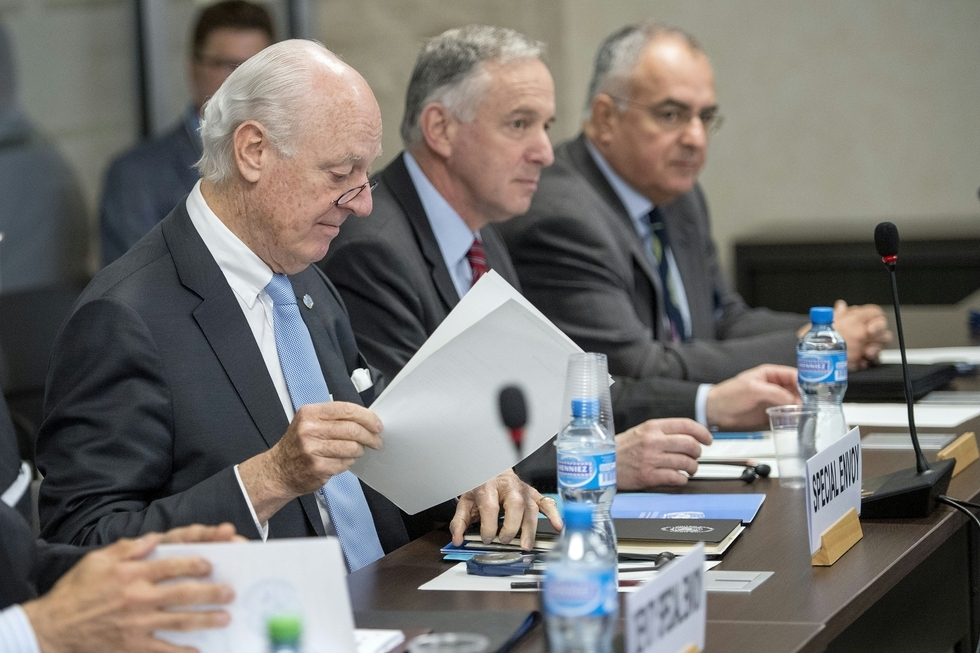At least 30 killed in Aleppo as air strikes hit MSF hospital

At least 30 civilians were killed late on Wednesday in government strikes on a Doctors Without Borders (MSF) supported hospital and nearby residential building in the Syrian city of Aleppo.
Among those killed was Dr Wasem Maaz, the only remaining paediatrician said to be in the eastern, rebel-held part of the city, according to an AFP correspondent on the ground.
Two anti-government groups, the Syria Revolution Network and the Local Coordination Commitees, on Thursday blamed the strikes on Russia, the Wall Street Journal reported. The Russian Foreign Ministry has not responded to the allegations.The UK-based Syrian Observatory for Human Rights monitoring group, however, has reported that the raids were carried out by "regime airplanes" and said two hospital guards and a doctor were among the dead.
The charity Doctors Without Borders (MSF), which said it had been donating medical supplies to the hospital since 2012, condemned what it called the "outrageous targeting of yet another medical facility in Syria".
Eight doctors and 28 nurses were working full time in the facility, MSF said.
"This devastating attack has destroyed a vital hospital in Aleppo, and the main referral centre for paediatric care in the area. Where is the outrage among those with the power and obligation to stop this carnage?" the charity said.
The UN's Syria envoy Staffan de Mistura said on Thursday that he planned to hold another round of peace talks next month but called for a ceasefire to be "revitalised" before setting a date.
De Mistura told the UN Security Council that gains have been made at peace talks despite escalating violence on the ground that continued to threaten a fragile truce.
He highlighted that all parties at the Geneva-based talks now recognised the need for a new transitional government in Syria that should be tasked with drafting a new constitution, even if huge divides remain on the nature of that government.
As the latest round of negotiations went into recess, de Mistura said he wanted to open a fresh set "during the course of May," to build on momentum earned so far.
He added, however, that he was holding off on fixing a date in the hope that world powers would use their leverage to strengthen the ceasefire, which needed to be "urgently revitalised".
"How can you have substantial talks when you have only news about bombing and shelling?" de Mistura said.
The UN envoy specifically cited the US, which supports some rebel groups, and government-ally Russia as countries that needed to intervene, calling on Washington and Moscow to organise a high-level Syria meeting before negotiations resume.
UN Secretary-General Ban Ki-moon on Thursday condemned the bombing of a hospital in Syria's rebel city of Aleppo and said attacks that target civilians are "inexcusable" violations of humanitarian law.
"There must be accountability for these crimes," Ban said in a statement.
The talks are focused on creating a transitional government capable of leading Syria out of a brutal civil war that has killed more than 270,000 people and displaced millions.
De Mistura insisted progress had been made on that key issue.
"No one is doubting anymore that there is an urgent need for a true and credible political transition," he told reporters.
"There is a clear understanding that a political transition should be overseen by a new, I repeat new, credible and inclusive transitional government, which will be replacing the present governance arrangement," he further said.
But the UN mediator declined to discuss the most daunting obstacle at the talks, which is the fate of Syrian President Bashar al-Assad.
The main opposition High Negotiations Committee (HNC) has insisted that Assad cannot be part of a transitional government and must agree to leave power as part of any peace deal.
Government negotiators have said Assad's fate is not on the agenda at the Geneva talks.
The HNC, backed by Saudi Arabia and the West, officially withdrew from this round last week to protest escalating violence, but left technical experts in Geneva who continued to meet with UN mediators.
Stay informed with MEE's newsletters
Sign up to get the latest alerts, insights and analysis, starting with Turkey Unpacked
Middle East Eye delivers independent and unrivalled coverage and analysis of the Middle East, North Africa and beyond. To learn more about republishing this content and the associated fees, please fill out this form. More about MEE can be found here.




